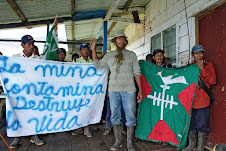29 Sep 2009 9:59 AM Nota publicada en el diario panameño La Estrella
Indígenas llegan a tierra coclesana
LINETH TORRERO
periodistas@laestrella.com.pa
La marcha se encuentra en Antón, donde se quedarán hasta mañana, para luego emprender camino a San Carlos
COCLÉ. Alrededor de 70 indígenas y campesinos que iniciaron la marcha hacia la capital desde el pasado 15 de septiembre, cuando salieron de Bocas del Toro y Chiriquí, para protestar contra hidroeléctricas y minería en sus comarcas.
El pasado sábado fueron recibidos en la provincia de Coclé.
Los indígenas de distintas comarcas luchan porque se respete el derecho a la salud, situación que según ellos se está complicando con el inicio de las actividades mineras y los daños a las cuencas que utilizan para sus necesidades con la colocación de hidroeléctricas.
Gritando consignas en rechazo a estas actividades y recordando la lucha de Victoriano Lorenzo, los indígenas descansaron la primera noche en la casa de la Cultura de Río Grande y la segunda en el gimnasio Algis Moreno de Penonomé, para posteriormente instalarse ayer lunes en la Casa del Campesino de la Parroquia de Antón donde permanecerán por dos días antes de continuar rumbo a San Carlos.
Federico Molina, comisionado de la Comarca Ñucribo de Guaribiora de Bocas del Toro, señala que la Comarca Ñucribo rechaza la construcción de hidroeléctricas y la minería, cuyos efectos los vienen sintiendo desde el 4 de septiembre del 2008, cuando les construyeron un pozo de 300 metros de profundidad para lavar minerales extraídos de la minería, pero este se derrumbó lo que contaminó el río. Ellos desconocían el efecto que esas concesiones mineras les produciría hasta que observaron la muerte de peces, animales y hasta de cinco personas incluyendo tres niños que utilizaban el agua del río, destacó. Los indígenas utilizan los ríos para lavar, bañarse y tomar agua.



